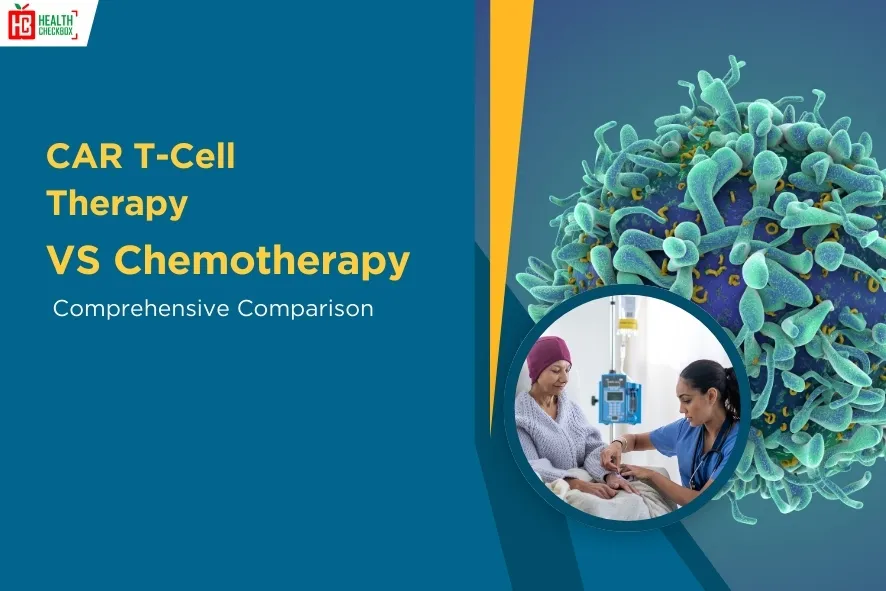CAR T-cell therapy vs chemotherapy, both used to diagnose cancer-multiplying cells. Chemotherapy is one of the treatments for cancer in which drugs are given to minimise the multiplication rate of cancer cells or to kill them. Chemotherapy is a systemic treatment in which drugs go through the whole body. It can affect the other organs, skin, hair, and nails. Chemotherapy can be used simultaneously with other treatments, such as operations or radiation therapies, or it can be used alone.
Whereas CAR T-cell therapy is given to provide a better target and to kill the cancer cells directly. If we talk about the word “CAR T-cell”, the T cells are a kind of blood cell called lymphocytes, and the basic function of T-cells is to improve and train your immune system to fight against diseases and bacterial germs.. “Chimeric Antigen Receptor T cells” are modified white blood cells. It’s an immunotherapy in which a team of doctors and researchers modifies the T-cells of the patient in a way that can kill the growing cells of that particular cancer.
What are the Key Differences Between CAR T-Cell Therapy vs Chemotherapy?
Several key differences between these therapies distinguish them from each other in medical terms. Both of them have different efficacies, different costs to treat, different fundamentals, and mechanisms.
Logistics and Cost
Chemotherapy is a standardized practice and is widely available in almost every cancer hospital. CAR T-cell therapy is extremely personalized and takes months or more to manufacture, as well as being more expensive than chemotherapy.
Effectiveness
In terms of efficacy, CAR T-cell therapy is known for its high recovery rates in some cancers. After a few years of recovery, cancer has a very low chance of reappearing. Whereas chemotherapy is one of the first therapies given to patients, it has a low remission rate.
Fundamentals and Mechanism
Both therapies work differently in terms of their mechanism. Chemotherapy uses drugs that minimize or eliminate the growing cancer cells. Whereas in CAR T-cell therapy, the T cell present in the patient’s body is modified in such a way that its ability to fight back the cancer cells or the immune system’s ability increases. In CAR T-cell therapy, the T cells are modified in such a way that they can target or kill the cancer cells directly.
Suitability of the Patient
Chemotherapy can be given to almost all cancer patients, but CAR T-cell therapy is tested first and can be an option for only some patients.
Duration of Treatments
Considering all the therapy sessions, CAR T-cell therapy takes less time because it is infused only once time or in some cases, it may be two. A patient is free to go home in a very short time, but the particular CAR T cell can still take time. On the other hand, chemotherapy is a long process where a person keeps on visiting the hospital for sessions of therapy. A complete cycle of chemotherapy can be several months or weeks.
Indications
Chemotherapy is used in almost all cancers, including tumour-related cancers. CAR T-cell therapy is used for blood cancers, mostly for those suffering from leukemia, myeloma, and lymphoma.
Side Effects of Chemotherapy and CAR T-Cell Therapy
CAR T-cell therapy has some potential side effects, such as low blood count, infections, or, in some cases. It seems that allergic reactions can also occur. CAR-T cell therapy can cause neurotoxicity and CRS (Cytokine Release Syndrome), which may result in mild fever, low blood count, or breathing difficulties.
Whereas chemotherapy is infamous for its side effects. While being in between a therapy cycle or sometimes after it, you may experience a sore throat and mouth, fatigue, weak immunity, anemia, shortness, and feeling like vomiting most of the time. It also causes effects on skin and hair, like dryness of skin or rashes that may occur in sunlight. Loss of Hair due to weak hair follicles.
Limitations of CAR T-Cell Therapy and Chemotherapy
CAR T-cell therapy is not widely available as of 2025, and is very costly and has some severe side effects, too. On the other hand, chemotherapy is the most widely used option for cancer treatment, and it’s available almost everywhere.
If a person has a solid tumour, CAR T-cell therapy is not available as it is limited to blood cancer treatment. CAR T-cell therapy can be less effective if a person has already had a cycle of chemotherapy before, because chemotherapy weakens the T-cells gradually.
Death Rate: CAR T-Cell Therapy vs Chemotherapy
- CAR T-Cell Therapy: In this therapy, the death rate is low. The percentage ratio of death rate in CAR T cells is 1-5%. The main reason for this rate is CRS(Cytokine Release Syndrome) and neurologic toxicity.
- Chemotherapy: The death rate is very low in chemotherapy as compared to CAR T cell therapy. It varies from 1-3% which depends on cancer stage and age.
Success Rate: CAR T-Cell Therapy vs Chemotherapy
- CAR T-Cell Therapy: The success rate in cancers like B-cell ALL or large B-cell lymphoma varies from 70-90%.
- Chemotherapy: Chemotherapy has a low success rate compared to cell therapy. It rates lie from 20-40% of success.
Conclusion
In summary, the conclusion between CAR T-cell therapy vs chemotherapy, both have their different terms and nature in every aspect. As chemotherapy is broadly available, low-cost compared with CAR T-cell therapy. But it has some major side effects that can change your physical appearance for a while or weaken you from the inside.
CAR T-cell therapy is also an option, but only for those suffering from blood cancers. Still, not every blood cancer patient’s immune system is suitable for this therapy. It is way more costly than chemotherapy, but it takes only a single Infusion into the body.

